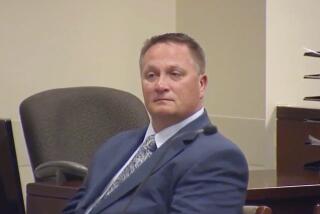Final Appeals Rejected, Killer Is Executed : Crime: Roger Coleman dies by electrocution in Virginia. He had failed a polygraph test earlier in the day. High court turned down his bid for a stay.
Roger Keith Coleman, the convicted Virginia murderer who had insisted he was innocent and who had won many supporters during his last months, was executed in the electric chair Wednesday night after the U.S. Supreme Court rejected his final appeals.
Coleman, 33, was pronounced dead at 8:38 p.m. PDT by a prison doctor at Greensville Correctional Center, 60 miles south of Richmond. Earlier in the evening, he said goodby to a girlfriend who visited him, ate a last meal of pepperoni pizza and chocolate ice cream and sat with his lawyers during his final hours, according to prison spokesman Wayne Brown.
The justices turned down Coleman’s bid for a stay of execution on a 7-2 vote that was announced one minute before his scheduled electrocution. The execution took place 39 minutes later. Justices Harry A. Blackmun and David H. Souter dissented.
Coleman died for the 1981 rape and murder of his sister-in-law, Wanda Fay McCoy.
Earlier Wednesday, Virginia Gov. L. Douglas Wilder announced that Coleman, a former coal miner whose case has received national attention in recent weeks, had taken a polygraph test at the request of his attorneys.
“The results showed the defendant was not truthful on the pertinent questions,” Wilder said. The governor explained that he allowed the test, administered Wednesday morning by a state police polygraph expert, in an “extraordinary and unprecedented” concession to the condemned man, who previously had refused to take a polygraph.
Wilder said the test showed that his rejection of clemency for Coleman on Monday was “warranted and justified.”
Defense attorneys filed an emergency petition with the Supreme Court after the full U.S. 4th Circuit Court of Appeals in Richmond refused earlier in the day to block the execution. A three-judge panel of the same court earlier this week refused to review the case.
In recent days, Coleman’s case received wide news media exposure as he, his attorneys and an independent investigator appeared on television news and talk shows.
“I did not murder Wanda McCoy. I did not rape Wanda McCoy. And I don’t know with absolute certainty who did,” Coleman said in one of his last television interviews Tuesday on the NBC “Today” program.
“The only thing that I can tell you with absolute certainty, I was not involved in this crime.”
His case focused renewed national attention on the death penalty because recently revealed evidence had raised doubts about his guilt.
A semen sample taken from the crime scene had proved to be key evidence in convicting Coleman. But his lawyers said a reanalysis of that sample showed it contained semen from two men, raising the possibility that someone else was involved in the murder. Further, they found several persons in the town of Grundy, Va., who said they heard another man admit to the killing.
Prosecutors responded they had no doubt about Coleman’s guilt based on DNA genetic testing of hair, blood and semen taken from the crime scene, and noted that his case had undergone 12 reviews by federal and state courts.
Coleman’s lawyers ran up against a federal court system that has been increasingly reluctant to reopen state death penalty cases.
Under Chief Justice William H. Rehnquist, the Supreme Court has put strict new limits on the ability of state inmates to challenge their convictions in federal courts. Rehnquist had complained that legal appeals drag on too long. Typically, a decade passes between a death sentence and the execution.
Coleman’s case itself yielded a stiff new rule in 1991. On a 6-3 vote in the case of Coleman vs. Thompson, the high court said that if a defense lawyer bungles in a state court--in this instance, by filing an appeal one day late--the inmate may not get a further hearing in the federal courts.
Because of that ruling, federal judges were under no obligation to grant Coleman a hearing on the newly revealed evidence. But U.S. District Judge Glen W. Williams said last week in Richmond that the new evidence did not convince him that Coleman was not guilty.
The Virginia courts had described the case against Coleman as “entirely circumstantial” but nonetheless convincing.
In 1981, Wanda McCoy and her husband, Brad, lived in a small, rented home above the fast-flowing Slate Creek in Grundy, an Appalachian coal mining town tucked into the corner of southwestern Virginia.
On the night of March 10, 1981, Brad returned from a night shift to find his young wife stabbed to death in a back room. Since there was no sign of forced entry, police turned their attention to the few persons in town who Wanda would have let in.
Coleman was married to Wanda’s sister and lived only a mile away. He had served time in prison for an attempted rape, and police made him their prime suspect.
A month after the murder, when semen and hair samples found at the crime scene matched Coleman’s blood and hair, he was taken into custody. A year later, he was tried, convicted and sentenced to death.
On Death Row, Coleman maintained that he had been wrongly convicted, and the prominent Washington law firm of Arnold & Porter agreed to take on his appeals.
More to Read
Start your day right
Sign up for Essential California for news, features and recommendations from the L.A. Times and beyond in your inbox six days a week.
You may occasionally receive promotional content from the Los Angeles Times.






